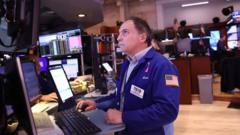US tech stocks found stability following a challenging day after the launch of DeepSeek, a Chinese AI application that claims to deliver lower-cost AI solutions compared to US competitors.
**US Tech Stocks Recover After DeepSeek AI App Shock**

**US Tech Stocks Recover After DeepSeek AI App Shock**
The emergence of the Chinese AI app DeepSeek prompts market volatility, raising questions about US tech dominance.
US technology stocks steadied on Tuesday after experiencing a significant jolt on Monday due to the unexpected rise of DeepSeek, a Chinese-made artificial intelligence application. Following a drop, shares of chip manufacturer Nvidia experienced a rebound of 8.8%- signaling that the initial AI sell-off may have been an overreaction. Investors quickly reassessed their positions in AI-related companies, provoked by DeepSeek's assertions highlighting that its model was developed at a fraction of the cost of its American rivals, stirring concerns about the United States' ongoing dominance in the AI landscape.
Commenting on the situation, US President Donald Trump labeled it "a wake-up call" for the tech sector and expressed optimism about the potential for cost efficiency, suggesting that achieving competitive results at lower prices could ultimately benefit the US economy. Despite the stir caused by DeepSeek, he reassured stakeholders of America’s sustained leadership in the field.
DeepSeek, having become the most downloaded free app in the US just a week post-launch, raises crucial questions about the potential implications for ongoing investments in AI technologies. Its entry comes amid escalating concerns over a tech race with China and ongoing restrictions on high-end chip sales to Chinese firms. In a bid to adapt, AI developers in China have collaborated and explored innovative avenues that require significantly less computing power than previously estimated, consequently slashing costs.
Nvidia, known for its pivotal role in powering major AI investments, faced a major setback on Monday with its stock plummeting nearly 17%, erasing roughly $600 billion in market capitalization. Analysts noted an initial trend of investor caution, where groundbreaking advancements elicit immediate sell-offs due to uncertainty; however, projections indicated that companies like Apple could benefit if AI development becomes more economical.
In the aftermath of Monday's turbulence, major US stock market indexes managed to stabilize; the Dow Jones Industrial Average increased by 0.3%, the S&P 500 rose close to 1%, and the tech-focused Nasdaq gained 2%. The UK’s FTSE 100 also reflected a modest gain, closing up 0.35%. Meanwhile, Japanese AI-related firms, such as Advantest and Softbank, witnessed notable declines amid this upheaval.
Founded in 2023 under the leadership of Liang Wenfeng, DeepSeek has attracted attention due to its performance capabilities, claiming to compete with advanced models from established US companies like OpenAI. Although technology figures, including OpenAI's Sam Altman, recognized its innovations and cost-efficiency, some skepticism remains regarding DeepSeek's actual performance and claims, with notable figures like Elon Musk casting doubts on the validity of its assertions.
As concerns about cybersecurity arise from DeepSeek's rapid rise, experts are increasingly stressing the importance of thorough assessments of quality, consumer trust, data management, and privacy. The AI marketplace is bracing for further developments, as the cost reductions suggested by DeepSeek could catalyze broader and faster adoption of AI technologies on a global scale.
Commenting on the situation, US President Donald Trump labeled it "a wake-up call" for the tech sector and expressed optimism about the potential for cost efficiency, suggesting that achieving competitive results at lower prices could ultimately benefit the US economy. Despite the stir caused by DeepSeek, he reassured stakeholders of America’s sustained leadership in the field.
DeepSeek, having become the most downloaded free app in the US just a week post-launch, raises crucial questions about the potential implications for ongoing investments in AI technologies. Its entry comes amid escalating concerns over a tech race with China and ongoing restrictions on high-end chip sales to Chinese firms. In a bid to adapt, AI developers in China have collaborated and explored innovative avenues that require significantly less computing power than previously estimated, consequently slashing costs.
Nvidia, known for its pivotal role in powering major AI investments, faced a major setback on Monday with its stock plummeting nearly 17%, erasing roughly $600 billion in market capitalization. Analysts noted an initial trend of investor caution, where groundbreaking advancements elicit immediate sell-offs due to uncertainty; however, projections indicated that companies like Apple could benefit if AI development becomes more economical.
In the aftermath of Monday's turbulence, major US stock market indexes managed to stabilize; the Dow Jones Industrial Average increased by 0.3%, the S&P 500 rose close to 1%, and the tech-focused Nasdaq gained 2%. The UK’s FTSE 100 also reflected a modest gain, closing up 0.35%. Meanwhile, Japanese AI-related firms, such as Advantest and Softbank, witnessed notable declines amid this upheaval.
Founded in 2023 under the leadership of Liang Wenfeng, DeepSeek has attracted attention due to its performance capabilities, claiming to compete with advanced models from established US companies like OpenAI. Although technology figures, including OpenAI's Sam Altman, recognized its innovations and cost-efficiency, some skepticism remains regarding DeepSeek's actual performance and claims, with notable figures like Elon Musk casting doubts on the validity of its assertions.
As concerns about cybersecurity arise from DeepSeek's rapid rise, experts are increasingly stressing the importance of thorough assessments of quality, consumer trust, data management, and privacy. The AI marketplace is bracing for further developments, as the cost reductions suggested by DeepSeek could catalyze broader and faster adoption of AI technologies on a global scale.





















